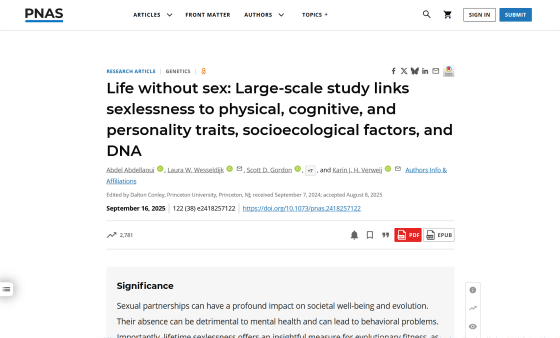A study into the common characteristics of people who have never had sex revealed that they tend to wear glasses from a young age, consume little alcohol, have a high level of education, and have a high income.

Sex is an important part of romantic relationships and family life, bringing personal happiness, health, and socioeconomic benefits. A research team led by
Life without sex: Large-scale study links sexlessness to physical, cognitive, and personality traits, socioecological factors, and DNA | PNAS
https://www.pnas.org/doi/10.1073/pnas.2418257122

1% of people don't have sex. New research shows it may be partially genetic
https://theconversation.com/1-of-people-dont-have-sex-new-research-shows-it-may-be-partly-genetic-265391
Some people have had many sexual encounters with many partners, while others have never had any, and research has shown that the gap in the number of sexual partners they have had is widening in recent years. If people are unable to find an intimate and supportive partner with whom they can have sex, they risk suffering from mental health problems, loneliness, social stigma , and economic disadvantage. They may also be drawn into the 'incel' movement (a group of people who have given up on marriage due to a long period of abstinence from the opposite sex). This trend is likely to be exacerbated online.
To address these issues, it is important to gain a deeper understanding of those who have never had sex. To address this issue, Zitzu and his team conducted a survey of approximately 400,000 people aged 39 to 73 in the UK and approximately 13,500 people aged 18 to 89 in Australia. They investigated the percentage of people who have never had sex and the commonalities and trends they observed.
The survey revealed that 3,929 people, or about 1% of the total, had never had any sexual experience, including oral or anal sex. Of these 3,929 people, 2,068 were women and 1,861 were men, meaning that both men and women had no sexual experience.

When the research team investigated the association between sexlessness and genetic and social environments, as well as a variety of physical, cognitive, personality, and mental health characteristics, they discovered several common trends among people who have never had sex.
It was found that British men who have never had sex tend to live in areas with relatively few women. Furthermore, sexlessness was more common in areas with large income disparities for both men and women. These findings are consistent with
Those who had no sexual experience were more likely to feel anxious and lonely, less happy, and less likely to receive visits from friends and family. They were also less likely to confide in others or feel that their lives have meaning. These results support the close relationship between sex and happiness.
Furthermore, people who had no sexual experience tended to have lower drug and alcohol use, higher levels of education, and started wearing glasses at a young age. People who had no sexual experience also had higher levels of education and higher intelligence scores, and surprisingly, having a higher income and higher socioeconomic status were also associated with having no sexual experience. Furthermore, men tended to have lower grip strength and arm muscle mass and less sexual experience, but no such correlation was found in women.
'The overall pattern of sexless people (being intelligent and academically successful, but physically weak and socially isolated) is consistent with existing stereotypes about low romantic success, especially during adolescence,' Zi-Tsu said. 'Wearing glasses and other typical ' nerdy ' traits from a young age may hinder adolescent romantic experiences, which may also affect romantic confidence in adulthood.'

The researchers also obtained genetic data from all participants and analyzed it, finding that genes could explain 15% of whether or not a person had sex, but that no single gene had a large influence on whether or not they had sex, and that many genes had small influences.
Other genetic factors that were positively correlated with sexlessness included introversion, autism spectrum disorder, and anorexia, while negative genetic correlations were observed with drug and alcohol addiction, depression, anxiety, and ADHD.
The results of this study are highly complex and uncertain, and the study did not investigate whether the subjects desired sex. This means that some of the subjects assigned to the 'sexually inexperienced' category may have been asexual , meaning they had no interest in sexual activity. However, because the correlation with regional gender ratios and the correlation with men's muscle strength cannot be explained solely by asexuality, the study results likely represent a mix of 'voluntary sexlessness' and 'involuntary sexlessness.'
'This study represents a significant advance in our understanding of sexlessness. However, to better understand how sexlessness relates to the interplay between genes, local environment, sexuality, and culture, it's important to assess desire and sexuality more nuancedly,' Zi Tsz said.
Related Posts:
in Free Member, Science, Posted by log1h_ik







